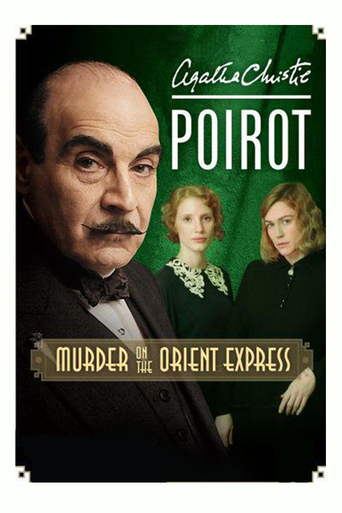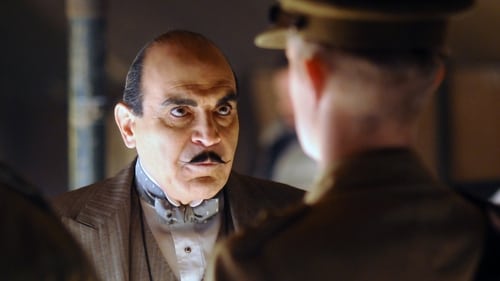SimonJack
By the time that this film was made of Agatha Christie's "Murder on the Orient Express," David Suchet had played the role of Hercule Poirot for more than two decades. In that time, he had delved into and dissected the character that Christie created. Suchet had played Poirot in dozens of films from Christie stories. He had studied Poirot's appearance, his manners and mannerisms, his speech and his carriage. Suchet had probed the depth of the character. And, he fine-tuned his arrogant behavior with subtle, small changes as he, and the character, matured in the role over the years. Audiences knew Hercule Poirot only as Suchet now presented him. It was now 3½ decades since the original defining "Orient Express" of 1974. Albert Finney in the lead role and more than a dozen big name screen stars of the day had presented a masterpiece on film. But in between, a 2001 modernized version of the story was made for TV and aired on CBS. To say that that version was forgettable would be the kindest thing one could say about it. So, with movie rights in hand, ITV took another look at Christie's story. The writers returned to the original story and considered the darker overtones of the novel. They made one change in the plot toward the end that added an aspect of intrigue. And this time, they looked more deeply into Poirot's character, which, by now, had become so familiar to many millions of people through the British TV series and many individual films. Christie wrote a background for her 1934 mystery based on a real event. In March 1932, a kidnapper took the one-year old baby boy of the Charles Lindbergh's from their home in New Jersey. Two months later, the boy's body was found in the woods not far from the home. This movie is set in 1938, as war loomed in Europe, so the fictional kidnapping and killing in the story would have been in 1933. By 2010, the millions of viewers and fans of the previous two decades would be very much aware of Hercule Poirot's strong views on types of crimes. He vehemently disapproved of murder. No one could ever be justified in killing another human being in cold blood. Poirot believed strongly in justice under the law. And, with this new film, viewers get a further look into Poirot. He cannot tolerate revenge that leads to vigilante justice. This differs from the book though, where Poirot was a little empathetic toward those who wanted to right a miscarriage of justice. The producers did many things to capture the time of the story. The train cars were rebuilt to resemble those of the 1930s, down to the decorations, art works and frills. The costumes, dress, makeup and grooming condiments were authentic for the period. Much research went into the planning of this new film. The script, direction and acting meticulously followed the manners, mannerisms and customs of the time.
The 1974 film was true to the book and met with Christie's approval. Yet it didn't explore the dark side of murder as deeply as does this 2010 film. In this film, the script and cast play it just slightly more somberly. And Greta Ohlssen iterates how the avengers justify their form of vigilante justice. It's when God has not seen that justice was done. The contrast with Poirot and his serious moral convictions (when he prays the rosary), is striking. Poirot's strong abhorrence for anyone killing another person remains. This film is every bit as good as the 1974 movie. Each has its own appeal, with a slightly different approach. The preferred roles of the casts vary between the films. Suchet's Poirot is slightly better than Finney's. But most of the rest of the cast in the 1974 film outshine the performances of the 2010 film. Richard Widmark's Rathchett is much better than that of Toby Jones who seems to be overacting at times. Sean Connery's Col Arbuthnot is much better than David Morrisey's role. And, Ingrid Bergman is for superior to Marie Croz at Greta Ohlsson.
paid in full
Considering how old the tale is, this is a perfect example of the genius of Agatha Christie.
But I will be very quick to add that with the casting can make or break such a gem. And this version is very well played. Poirot(Suchet) has now earned his reputation as a great actor and it allows the viewer to really enjoy the tale.
So about the tale...without giving away too much, I will say that this movie is worth the watch...every bit of it.
Enjoy.
clytamnestra
We all know the solution to this specific Poirot mystery: 'they all did it'. So when working my way through this series i wasn't even sure it'd bother to watch this episode.But what a pleasant surprise: the writers also realized that the viewers know the basics so they just go through the motions in that regard (the kidnapped baby, the letter 'H', the false evidence, etc). Far easier than in any other Poirot-episode do we get to the truth: they all did it, and they aren't ashamed, in fact the killers are practically bragging about their clever ruse (which makes sense, i suppose, of course they are happy to let everyone know about their revenge).Where most episodes are a 'who done it' this episode is all about Poirot's moral choice: this is a man whose 'holy mission' is to expose the truth and let the law take it from there. That truth may come at a high cost, but he will not be guilt-tripped for exposing it: if 'a good man' lied and committed suicide than that's his fault/choice and not Poirot's.The intro with the stoned woman in Istanbul doesn't make much sense in other versions of this story, but here it all kinda comes together. Poirot respecting 'the law of the land' and keeping his opinion to himself (keep in mind he is _not_ English). His faith that he is an instrument of god. The struggle it is for him to turn a blind eye. An element i haven't seen mentioned in other reviews is the racist attitude of the killers (if there is anything 'typically English' to be found in this tale it's here, in the nonchalant prejudices). Of course every judge in the world would go light on them, would bent over backwards to let them get of with a slap on the wrist. But that's not what they are after, their fear is not as much facing a judge but facing a Yugoslavian judge. To them the entirety of eastern Europe is fly-over country, a backwards backwater with less justice than the corrupt Chicago judge who set the child-murdering mafia-guy free. That's a hard sell for a war-refugee: to say 'we do not acknowledge local legal sovereignty'.Poirot was thus far presented as 'the perfect detached gentleman': a nice guy, who is always emotionally-stable and whose emotions never appear to run very deep. Here we see a different view of him, a view that is probably shocking to those who equate 'intelligence' and 'intelectual rigor' with 'millitant atheism'.
cab-63591
In the U.S. there are two types of people — those who are played by the establishment media's morality tales of Political Correctness, and those who are not. I am of the latter, and that is why this episode of Poirot at long last has ruined the entire series for me, because the writers sleazed such a pathetic morality tale into an Agatha Christie classic, where such a tale does not exist — nor anything like it in her entire body of work.The vignette about the stoning of the Istanbul adulteress was entirely made up — "exo tou dramatos." It was to set up Poirot's contrived statement later (about the then-used English death penalty) that was so ignorant and lacking reason it would prove he could never be able use reason well enough to detect his way out of a wet paper bag. Christie made Poirot's entire raison d'etre to send murderers to the gallows. Then these lame TV writers come along and morally equate the basis of their own gravy train to ad hoc street stonings of adulterous women.




